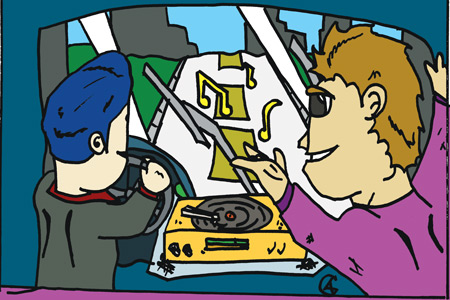Life without a laptop: MRU’s technology 30 years ago
by Krista MacPherson
The Reflector

Illustration by Aaron Chatha. It’s hard to believe that once upon a time, a record player in your car was high tech. Put that baby in and drive real slow over bumps.
Can you imagine Mount Royal University without the Internet? How about without computers in the library, or computer labs at all? Could you fathom writing those often talked about “10+ page papers” by typewriter — or worse yet, by hand? How about a life without a cellphone or an iPod for that instant, ongoing sensory stimulation?
Most of the student body at Mount Royal was born into the technological era known as “Generation Y,” a group whose characteristics include independence, empowerment, racial and ethical diversity and, above all else, an innate ability for using technology.
If you fit into this category, then you probably couldn’t imagine living life without the technological luxuries that you have. Though 30 years ago, a limit to the information at one’s fingertips was reality for most Mount Royal students.
Norm Sparks, an ’81 graduate from the broadcasting program at what was then Mount Royal College, set the scene nicely: “When I was a kid around 10 years old, I used to come to Mount Royal to listen to records in the library.
“Mount Royal had these large things about the size of two Smart Cars parked end to end. They were called computers. I would type my name on the keyboard and it would spit out a big stack of cardboard cards with tons of little holes punched out in each card. These punch cards represented my name.
“They weren’t very useful at that stage, but they were cool to me and I knew there was going (to be a) big future somehow.”
Steve and Susan Boland, computer science graduates in ’83 and ’84 and staff at MRU today, can verify Sparks’ tale. Computers around the school were hooked up to massive servers. To give you an idea of the size, two servers took up enough space to fill a modest-sized classroom.
“There was Internet,” Steve Boland assured, “but it was entirely text. There were no graphics and you could only scroll up and down.”
Every computer was hardwired to connect to the Internet because there was no wireless.
“Wireless didn’t exist,” Susan Boland added. Desktop computers, like the servers, were one bulky, independent unit, similar to the CRT TVs of many of our childhoods.
The Bolands had an advantage that other students didn’t: they had free rein of the computer situation and could type and print out assignments at their leisure.
Granted, such assignments were printed on that pre-folded paper with the holed, tear-off sides, so it was nothing compared to the paper selection of today. Sparks, as well as students in other programs at that time, weren’t so lucky. Assignments, essays, resumes and other documents were either handwritten or typed on a typewriter.
Portable music players were also something completely different. Walkmans playing cassette tapes were all the rage, some even fancy enough to play AM/FM radio. They also used the colourfully named “ghettoblasters” and records.
“My cousin actually had a portable record player in his car,” Sparks said. “You slid your LP records or 45s into the unit like a CD into a MacBook, and hoped you didn’t hit any bumps or the record would skip.”
Liane Angerman, a recent Mount Royal graduate from the English program, said that even up until she graduated in 2007, things were much different than how they are today.
Some of Angerman’s teachers would use the projectors still, while others were beginning to use Blackboard software. “I even had teachers who would still write on the chalkboard.”
While this sort of eclectic approach is still evident today, instruction is starting to veer more in the direction of becoming solely digital.
When asked about PDF periodical availability, Angerman said they did have some, but even then, she preferred finding articles manually and photocopying them rather than finding their PDF and saving them.
Hearing these stories, I couldn’t even imagine life without the technology of today. Clearly, these alumni conquered their primitive technology years and are still here to recount their unbelievable tales. I couldn’t help but wonder: what would be some of the technology that they felt they couldn’t live without today?
“Accessibility of resources,” Susan Boland admitted, “and e-books.”
Her husband agreed. One thing he really appreciates is that most instruction manuals can be easily found online.
Sparks listed his iPod, iPhone and MacBook Pro as things he couldn’t live without today. “I had to go without my (MacBook Pro) for 10 days a few weeks ago and it was the worst 10 days (of) my life.”
“Definitely my BlackBerry,” Angerman said as we shared a smile and looked over at our Blackberrys not more than 20 centimetres apart.
And in a few years, our current alumni will be talking about those old, clunky Macs and PCs in the computer labs.







A well written article. It is amazing how things have changed over the last 10 to 15 years. What will be happening 20 years from today? The days of the file cabinet filled with files are now gone.
Roy Freeborn